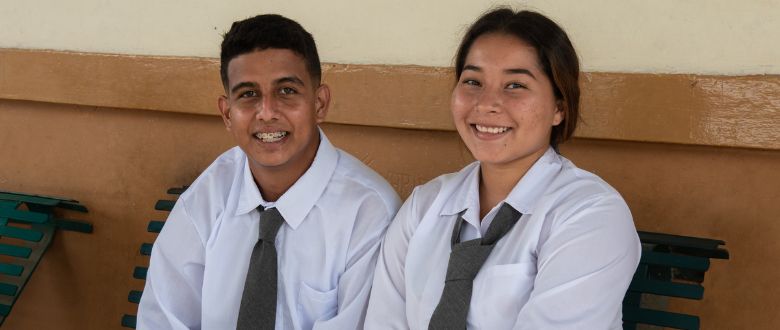
With a 6.1% share in 2020, tourism featured among the six industries with the greatest contribution to Ecuador’s national employment. 2021 World Tourism Day is an opportunity to look beyond such tourism statistics, and to acknowledge that, behind every number, there is a person. In the case of Ecuador, this is often a young person, a woman or a member of one of the country’s indigenous communities. Together with other stakeholders, they call for a responsible, sustainable, and resilient tourism ecosystem that ensures that the benefits from tourism’s renewed growth are felt outside of the sector itself and help advance wider progress. Quality TVET can contribute to this transformation.
Skilling for Sustainable Tourism
For the past three years, VVOB has been supporting the 21 secondary schools in the canton of Quito and the province of Manabí that offer the tourism-related areas of study in the national curriculum for TVET – more specifically the ‘Bachillerato Técnico Ventas e Información Turística’ and the ‘Bachillerato Técnico Servicios Hoteleros’ (freely translated as tourism information and sales; and hotel services, respectively) – with the Skilling for Sustainable Tourism project.
To improve the quality and relevance of tourism learning for the more than 4,000 students who enrolled in these areas of study since 2018, VVOB and Ecuador’s Ministry of Education have brokered a range of partnerships with community and ecotourism initiatives, hotels, tour operators, universities and organisations providing capacity development in the tourism sector – all committed to sustainable tourism.
These partnerships are organised around three levers for skilling for sustainable tourism:
- Training teachers in the latest sustainable tourism trends and in pedagogical practices, such as project-based learning, that promote the development of technical and transferable skills
- Developing learning content and materials aligned with industry standards
- Providing students with work-based learning opportunities.
Head teacher Miguel Arcángel Mero from Manabí finds that these collaborations benefit everyone: “The school community has visibly increased their knowledge of the [tourism] sector; our relations with strategic allies are stronger, such as the Ministry of Environment, […] and in the private sector, hotels and restaurants have become key partners in providing on-site job training and coaching. This makes a big difference to our TVET system.”
Shared ambitions
Hard-hit by the COVID-19 pandemic, the tourism sector in Ecuador finds itself at a crossroads. A structural transformation is needed to build a responsible, sustainable, and resilient tourism ecosystem. Educators and students are keen on innovation, inclusion, and greener development and want to contribute.
During a series of dialogues and high-level events organised to galvanise the alliances needed for this transformation, Rodrigo Pacheco, Chef and Founder of Bocavaldevia and Good Will Ambassador for the United Nations Food and Agriculture Organization put it as follows: “In the post-covid world synergies are essential. We can no longer work in isolation and the need to integrate education and youth in the development of the tourism sector is more crucial than ever. TVET opens the door to the companies where youth can put their knowledge to practice.”
The stakeholders from TVET and tourism expressed the need and ambition to:
- Create an enabling policy environment and regulatory framework that foster innovations and collaboration between schools and actors in the world of work
- Underpin skills-based curricula with a thorough understanding of the demands of the tourism sector in connection with local and global development agendas
- Strengthen and expand inter-sectoral collaboration, by seeking allies across connected areas, such as environment and labour
- Place youth and particularly women at the center of the discussion, making them not only recipients, but also co-creators of the future of tourism.
With Skilling for Sustainable Tourism and on high-visibility days like World Tourism Day, VVOB hopes to reach new partners in making sure TVET works for tourism – and the people behind the buzzing sector.




